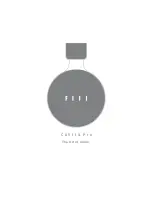
Putting the system into operation
10 |
RS 4200 II
Inserting and removing the receiver’s
rechargeable battery
The receiver is delivered with the battery inserted.
왘
Insert the battery into the compartment
as shown on
the left. Make sure that the battery is inserted correctly.
왘
To remove the battery, use the finger catch projection to
pull the battery out of the receiver.
왘
Before using the rechargeable battery for the first time,
charge it until the LED
lights up green (see “Storing
and charging the receiver” on page 13). This can take a
maximum of 3 hours.
Inserting a spare rechargeable battery into the
transmitter’s charging compartment
You can charge a spare battery (not included) in the
charging compartment
at the side of the transmitter.
This spare battery is not required for operating the
RS 4200 II but offers extended listening time while the dis-
charged first battery is being recharged.
왘
Insert the spare battery into the charging com-
partment
as shown on the left.
왘
If the battery is inserted correctly, the LED
lights up
Replacing the ear pads
The product is supplied with two pairs of ear pads in dif-
ferent fits. You can change to these ear pads to optimize
the wearing comfort, if necessary (see “Cleaning the ear
pads” on page 15).
2
A
B
red:
The rechargeable battery is being charged.
green: The rechargeable battery is fully charged.









































